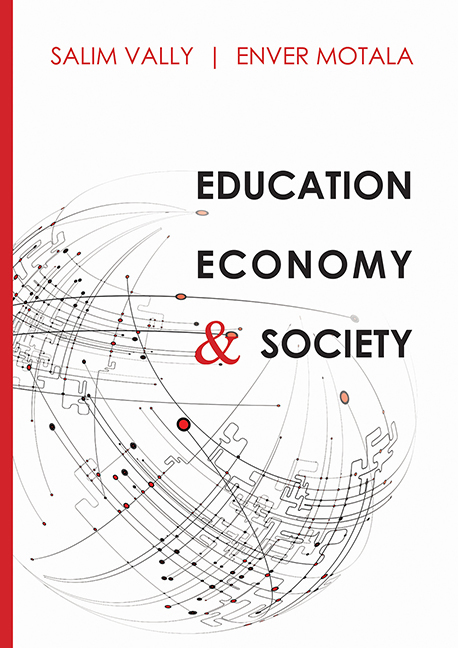Book contents
- Frontmatter
- Contents
- Foreword
- Preface
- About the contributors
- Acknowledgements
- Abbreviations and acronyms
- Chapter 1 ‘NO ONE TO BLAME BUT THEMSELVES’: Rethinking the Relationship between Education, Skills and Employment
- Chapter 2 EDUCATION AND ECONOMY: Demystifying the Skills Discourse
- Chapter 3 UNIVERSITIES AND THE ‘KNOWLEDGE ECONOMY’
- Chapter 4 GOING AROUND IN CIRCLES: Employability, Responsiveness, and the Reform of the College Sector
- Chapter 5 BUILDING A TRANSFORMATIVE PEDAGOGY in Vocational Education
- Chapter 6 SKILLS? WHAT SKILLS? JOBS? WHAT JOBS? An Overview of Research into Education/Labour Market Relationships
- Chapter 7 DEBATING THE NEXUS of Education, Skills and Technology in the Age of Lean Production: A Case Study of the ArcelorMittal Vanderbijlpark Plant
- Chapter 8 SKILLS, JOBS AND DECEPTION: Examples from the South African Workplace
- Chapter 9 ON THE USE AND ABUSE OF EDUCATION: Reflections on Unemployment, the ‘Skills Gap’ and ‘Zombie Economics’
- Chapter 10 THE YOUTH WAGE SUBSIDY in South Africa: Employment, Skills and ‘Churning’
- Chapter 11 EPISTEMIC INJUSTICE and the Struggle for Recognition: Human Dignity and the Recognition of Prior Learning
- Chapter 12 (RE)CLAIMING WORKERS' EDUCATION
- Chapter 13 SKILLS DEVELOPMENT in Post-Apartheid South Africa: Issues, Arguments and Contestations
- Index
Foreword
Published online by Cambridge University Press: 16 February 2020
- Frontmatter
- Contents
- Foreword
- Preface
- About the contributors
- Acknowledgements
- Abbreviations and acronyms
- Chapter 1 ‘NO ONE TO BLAME BUT THEMSELVES’: Rethinking the Relationship between Education, Skills and Employment
- Chapter 2 EDUCATION AND ECONOMY: Demystifying the Skills Discourse
- Chapter 3 UNIVERSITIES AND THE ‘KNOWLEDGE ECONOMY’
- Chapter 4 GOING AROUND IN CIRCLES: Employability, Responsiveness, and the Reform of the College Sector
- Chapter 5 BUILDING A TRANSFORMATIVE PEDAGOGY in Vocational Education
- Chapter 6 SKILLS? WHAT SKILLS? JOBS? WHAT JOBS? An Overview of Research into Education/Labour Market Relationships
- Chapter 7 DEBATING THE NEXUS of Education, Skills and Technology in the Age of Lean Production: A Case Study of the ArcelorMittal Vanderbijlpark Plant
- Chapter 8 SKILLS, JOBS AND DECEPTION: Examples from the South African Workplace
- Chapter 9 ON THE USE AND ABUSE OF EDUCATION: Reflections on Unemployment, the ‘Skills Gap’ and ‘Zombie Economics’
- Chapter 10 THE YOUTH WAGE SUBSIDY in South Africa: Employment, Skills and ‘Churning’
- Chapter 11 EPISTEMIC INJUSTICE and the Struggle for Recognition: Human Dignity and the Recognition of Prior Learning
- Chapter 12 (RE)CLAIMING WORKERS' EDUCATION
- Chapter 13 SKILLS DEVELOPMENT in Post-Apartheid South Africa: Issues, Arguments and Contestations
- Index
Summary
This excellent volume, Education, the Economy, and Society, edited by Salim Vally and Enver Motala, offers a trenchant critique of the concepts, frameworks, and interventions that underlie much of the South African education policy. The exposition of the book offers insight into education and development issues faced around the world. It offers a more fundamental commentary than most and deserves to be read by a global audience. Among its many virtues, the book offers a critique of three key current discourses.
The skills or mismatch discourse dates back to at least the 1950s, and probably long before that. In it, education has been blamed for not supplying the skills that business needs; education is blamed for the mismatch between what education produces and what business wants. The cause of unemployment, in general, is put at education's door, more broadly arguing that education is not teaching what the economy needs. It is, unfortunately, true that many children and youth around the world leave school without the basic skills necessary for life and work. But the mismatch discourse is usually less about basic skills and more about vocational skills. The argument, while superficially plausible, is not true for at least two reasons. First, vocational skills, which are often context-specific, are best taught on the job. Second, unemployment is not a worker supply problem, but a structural problem of capitalism. There are two or more billion un- or under-employed people on this planet, not because they don’t have the right skills, but because full employment is neither a feature nor a goal of capitalism.
Underlying the skills discourse is the human capital discourse. In the 1950s and earlier, the neoclassical economics that underpins capitalist ideology and practice had a problem understanding labour. While the overall neoclassical framework was embodied in mathematical models of a fictitious story of supply and demand by small producers and consumers, labour economics was more sociological and based on the real world, dealing with institutions like unions and large companies, and phenomena like strikes, collective bargaining, and public policy. The advent of human capital theory in the 1960s offered a way to deal with labour in terms of supply and demand (mostly supply), as a commodity like any other.
- Type
- Chapter
- Information
- Education, Economy & Society , pp. vii - ixPublisher: University of South AfricaPrint publication year: 2014

